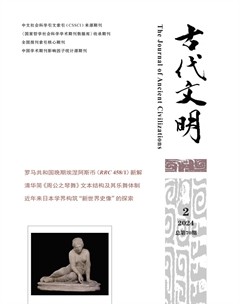[Ancient Mediterranean Civilizations]
Title: Rethinking Caesar's Aeneas Coin (RRC 458/1) from the Late Roman Republic……………………/3
Authors: Zhang Hongxia, Post-doctoral Researcher, School of History and Culture, Northeast Normal University,Changchun, Jilin, 130024, China; Sven Günther, Professor, Institute for the History of Ancient Civilizations, Changchun, Jilin, 130024, China.
Abstract: It is often believed that Caesar's famous Aeneas coin (RRC 458/1) was issued in North Africa between 47 and 46 BC, but the evidence is relatively weak. The location of the relevant coin hoards only overlaps with the first part of Caesar's march from Gaul south to Italy and then to Africa. It can thus be speculated that the coin was made in Gaul, rather than in North Africa. The pattern of the Aeneas coin hints at the connection between Caesar and Venus in order to enhance personal prestige. This was likely method used by Caesar in the public opinion battle before and during his confrontation with Pompey, while not a blatant propaganda after taking control of Roman power as dictator. This consideration supports an earlier date of the Aeneas coin–being issued before or shortly after 49 BC. The iconographic study reveals the transformation of political identity that had been bound to aristocratic families under the guise of the republic interests but now depended more and more on individual commanders with their personal interests during Rome's transition from republican to imperial times.
Key words: Aeneas coins; civil war; Caesar; Pompey; Roman Republic; legitimacy
Title: A New Interpretation of Tacitus' Comments on Principate………………………………………………/15
Author: Ma Jiancheng, PhD Candidate, Institute for the History of Ancient Civilizations, Northeast Normal University, Changchun, Jilin, 130024, China.
Abstract: In the Annals (1.9-10), Tacitus reviews the pros and cons of Augustus’ life. On the one hand,Tacitus acknowledges that Augustus indeed brought peace and order after a century of civil strife; on the other hand, he emphasizes that the peace under Augustus was a bloody peace because it came at the expense of the Senate. Despite the realistic need to maintain peace and stability in the empire, Tacitus is not hostile towards the Principate as a form of government. However, as a member of the Senate, Tacitus realizes that the military dictator tends to eliminate his competitors through violent means, and warns his readers against the degeneration of the Principate into a hereditary monarchy.
Key words: Tacitus; Augustus; Trajan; Hadrian; Principate
[Byzantine and the European Middle Ages]
Title: A Study of the Royal Legislation and Decrees of the Merovingian Kingdom…………………………/24
Authors: Dang Jiayu, PhD Candidate, Department of History, College of Liberal Arts, Jinan University, Guangzhou,
Guangdong, 510632, China; Li Yunfei, Professor, Department of History, College of Liberal Arts, Jinan University, Guangzhou, Guangdong, 510632, China.
Abstract: Clovis, the founding monarch of the Merovingian Dynasty, took into account jurisprudence,history and reality, confirmed the effectiveness of traditional laws such as Roman law, church law and tribal law, and built a pluralistic legal order dominated by the royal power. In the sixth and seventh centuries, the Merovingian Kings further integrated the diverse legal traditions, formulated the royal decrees, and improved the legal governance system of the kingdom, which realized the transformation of the Frankish kingdom from a tribal regime in the late Empire to an early medieval state. Merovingian royal legislation played an important integration function in balancing the central legal relationship, enhancing the public nature of the royal power, consolidating the consensus of the king and subjects, and had a profound impact on the legal construction of the Carolingian dynasty.
Key words: Frankish Kingdom; Merovingian Dynasty; legislation; royal decrees; integration
Title: The Title of Ludwig II and the Political Changes in East Francia……………………………………/37
Authors: Xu Zebin, PhD Candidate, School of History and Culture, Northeast Normal University, Changchun, Jilin,130024, China; Wang Jinxin, Professor, School of History and Culture, Northeast Normal University,Changchun, Jilin, 130024, China.
Abstract: King Ludwig II of East Francia was mentioned by many different titles throughout his reign, reflecting different imaginations of the regime. An examination of the titles accepted by Ludwig himself, such as "King of Bavaria" and "King of East Francia", reveals the correlations between these titles and the political changes in East Francia. A comparative analysis of the titles accepted by Ludwig II with the titles used only by other people reveals the differences between the early medieval Frankish regime and both classical Germania and modern Deutschland. Accordingly, the reign and ethnic identity of King Ludwig II should be re-evaluated.
Key words: Ludwig II; title; Deutsche; medieval politics
[History of Pre-Qin China]
Title: The Textual Structure and Music-Dance System of "The Qin Dance of Duke Zhou" in Tsinghua Bamboo Slips………………………………………………………………………………………………/49
Author: Li Shaohua, Lecturer, School of History and Culture, Northeast Normal University, Changchun, Jilin,130024, China.
Abstract: "Th







